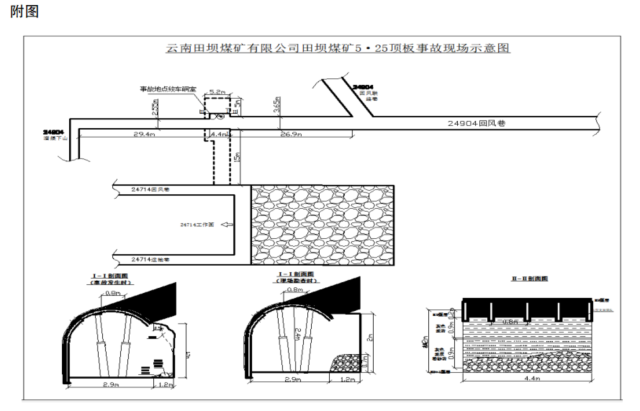Yunnan Bureau of National Mine Safety Administration today released the investigation results of the fatal roof collapse accident at Yunnan Tianba Coal Mine: the investigation found that the direct cause of the accident was personnel working unsafely without proper roof support. It is recommended that 18 responsible individuals be held accountable; the coal mine company is to be fined 700,000 yuan and ordered to suspend production for rectification.
Tianba Coal Mine is located in Tianba Town, Xuanwei City, Qujing, Yunnan Province. At around 1:30 AM on May 25, 2025, a worker was buried by a sudden roof collapse while working underground and died on the way to the hospital.
The investigation report shows that the direct cause of the accident was personnel working unsafely without proper roof support. Indirect causes included inadequate on-site safety management, safety education and training, and insufficient supervision at the mine. The accident was determined to be a production safety responsibility incident.
The investigation recommends that the shift supervisor at the time of the accident be referred to judicial authorities for investigation and handling; five responsible individuals, including the mine’s deputy head of safety, chief engineer, and the company’s deputy general manager of safety, deputy general manager of production, and chief engineer, respectively receive administrative penalties, suspension of their safety production knowledge and capability certification, and administrative fines; the Yunnan Tianba Coal Mine Company is to be fined 700,000 yuan, ordered to suspend production for rectification, have its safety production license temporarily revoked, and its safety production standardization management system level downgraded.
Yunnan Tianba Coal Mine
The Yunnan Tianba Coal Mine is a significant industrial site in China’s Yunnan province, historically important for its coal extraction which fueled regional development. While its specific founding date is not widely documented, it represents the broader history of China’s mining industry and its role in powering the nation’s economic growth.
Tianba Town
Tianba Town is a historic town located in the mountainous region of Chongqing, China, known for its well-preserved traditional architecture and role as a trading post. Its history dates back centuries, serving as a vital hub along ancient salt transportation routes. Today, it is recognized for its cultural heritage and attracts visitors with its distinctive stilted houses and serene natural surroundings.
Xuanwei City
Xuanwei City is a county-level city in Yunnan Province, China, historically known for its strategic location along trade routes. It is most famous for its production of Xuanwei ham, a dry-cured ham with a history and reputation dating back to the early 20th century.
Qujing
Qujing is a prefecture-level city in Yunnan Province, China, known for its rich history dating back over 2,000 years. It is historically significant as the birthplace of the Cuan culture and was a vital part of the ancient Southern Silk Road. Today, the area is also recognized for important paleontological discoveries, including fossils of early Devonian fish.
Yunnan Province
Yunnan Province is a culturally and ecologically diverse region in southwestern China, historically inhabited by numerous ethnic groups and once part of the ancient Dian Kingdom and later the Nanzhao and Dali kingdoms. It is renowned for its dramatic landscapes, which range from snow-capped Himalayan mountains to tropical rainforests, and is a significant area for biodiversity and tea production. The province also served as a key hub on the historic Southern Silk Road, facilitating trade and cultural exchange between China and Southeast Asia.




